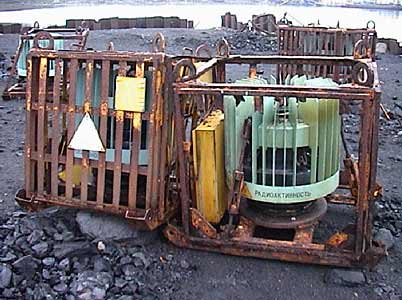Russia Develops Nuclear Battery for Arctic
It is a team of scientists at the former nuclear weapon production site in Zheleznogorsk in Siberia are developing a battery that generates electricity from an isotope of Nickel (Ni-63).
Ni-63 can only be produced from natural existing Ni-62 in a reactor followed by enrichment in gas centrifuges. It has a half-life of 100 years and can therefore provide power for at least 50 years.
The technology, being developed by the nation’s nuclear agency Rosatom and other Russian agencies, is well suited to the Arctic, reports local Russian media sources, and is suitable for miniaturization and providing electricity to sensors, monitors and other equipment located in hard to reach locations and under extreme conditions, including space.
The new material developed has a power density of up to 100 microwatts per cubic centimeter. Existing Ni-63 power supplies produced overseas use a low nickel-63 concentration, and the innovation the Russian scientists have achieved is to economically produce a higher concentration supply.
 Nuclear batteries are not new. Around 1,000 radioisotope thermoelectric generators have been used to produce electricity in remote areas such as lighthouses during the 1970s. Typically, these devices had had a strontium (Sr-90) power source.
Nuclear batteries are not new. Around 1,000 radioisotope thermoelectric generators have been used to produce electricity in remote areas such as lighthouses during the 1970s. Typically, these devices had had a strontium (Sr-90) power source.
The strontium used in thermoelectric generators is highly radioactive and deadly toxic. Unlike Ni-63, it emits gamma radiation. Norway and Russia resolved to replace the Sr-90 devices in lighthouses with solar panels this century, and in 2013, during the replacement process, authorities noted several cases of missing devices.
The loss of the devices, coupled with Russia’s plan to start using similar technology again in remote areas in the Arctic is concerning nuclear physicist Nils Bøhmer of the Bellona Foundation, reports the Independent Barents Observer.
“What the world doesn’t need right now are more remotely located radioactive sources that could be stolen by terrorists and used in dirty-bombs,” he said, pointing out that remote locations pose security risks.
His warning comes after concern has been raised about terrorist attacks involving nuclear technology. Video footage of a top official at a Belgian nuclear facility was discovered last year in the apartment of a suspected Islamic State militant linked to the 2015 Paris attacks.
Asked last week whether there was a danger of the Islamic State’s obtaining a nuclear weapon, the British defense secretary, Michael Fallon, said that it was “was a new and emerging threat.”
